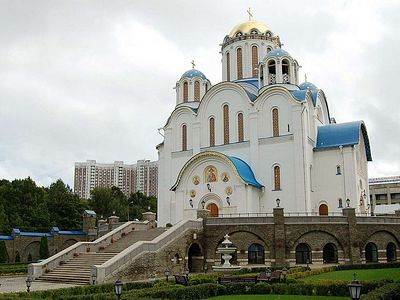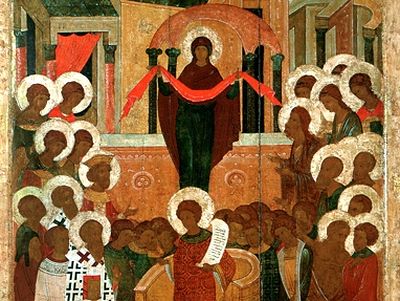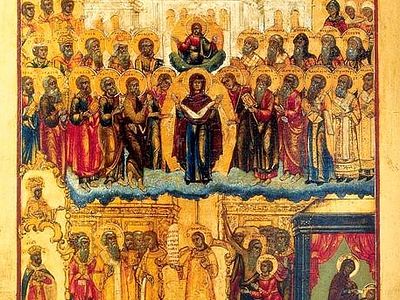The feast of the Protection of the Mother of God is one of the most favorite yet paradoxical feasts for Russians. It is a paradox because, according to one version of history, on this day more than 1000 years ago the ancestors of today’s Russians attacked Constantinople and would have taken it, had not the Mother of God intervened. Priests Nicholai Bulgakov and Valery Dukhanin contemplate this “celebration of defeat.“
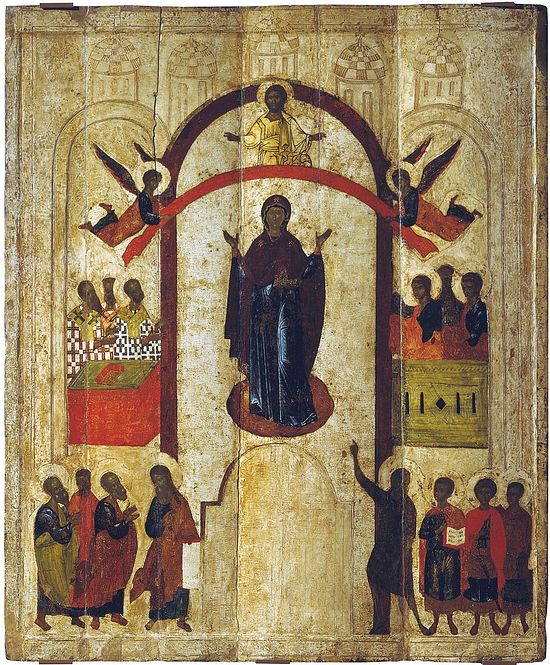
* * *
“The Protection of the Mother is the alpha and omega of our history”
Priest Nicholai Bulgakov, rector of the church of the Reigning Icon of the Mother of God in the village of Kratovo in the Moscow region:
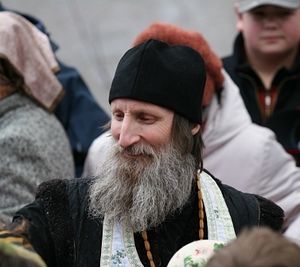
The Mother of God has given no one in the world so many blessings, no one has she saved so many times from impending death, on no one’s land has she revealed so many of her wonderworking icons—in other words, no one has she protected with such motherly care as she has protected, and protects our people and our country, from ancient times termed the House of the Theotokos.
From the very beginning, when our ancestors were convinced that the Mother of God has might invincible, they displayed humility, not kicking against the pricks, and Rus’ was baptized, and already many times, in manifold ways the Fervent Protectress has saved us, such that today we resolutely know and confess: if not for her protection, then we would have ceased to exist already long ago. How could we not celebrate this feast as one of the most important, and most beloved of our feasts?!
The Protection of the Mother of God is the alpha and the omega of our history. This is the main thing our youth should know about their motherland. We need to know this in order to properly understand all our past events and in order to understand upon what above all to hope in the future: wherein lies our greatest strength, our main support.
It’s no accident that in our land on the day of the Protection of the Mother of God the first snow often falls—the heavens themselves speak of the special connection between this feast and our northern country, and of that by her protection the All-Pure one answers the snow-white purity of our thoughts and feelings.
Why does the Mother of God so love our people and our country? Why has she chosen it as her inheritance? Perhaps because just as her snowy veil completely covers the whole land, so in Russia, as nowhere else, with our inherent trustfulness and candor, we have always understood the Christian life as life according to all the truth of God, as a whole: in the cottage, and in the field and in school and in the army, and even to conclude a transaction for our ancestors, it was enough just to kiss the cross.
One thing we know for sure: we should, with unending wonder and awe, every year on this day bless the Queen of Heaven for all her mercies granted to all our previous generations, and with no less trepidation expect her to not take her protection from us in the future.
* * *
“The feast of the Protection is experienced and felt by the heart as the relationship of a loving mother with her own children”
Priest Valery Dukhanin, candidate of theology, vice-rector of the Nicholas-Ugreshky Theological Seminary:
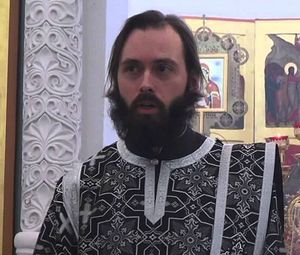
My spiritual father, Archimandrite Iliya (Reizmir), spoke of a situation with his spiritual daughter Lydia who was suffering from breast cancer. Her operation didn’t help, and she was completely depressed, and being alone in the ward, she began to pray: “Lord, I believe—why do I suffer so?” At that moment the Mother of God herself appeared to her as she is depicted in the Kazan Icon, and said: “Lydia, why are you despairing? You are not forsaken.” Although the doctor released Lydia home as hopeless, literally a few days after Confession, Communion of the Holy Mysteries and Unction she was completely healed. The Mother of God did not leave her. She knows human sorrow and always intercedes for those who sincerely ask from their hearts.
Generally, the meaning of the feast of the Protection is impossible to explain rationally or reasonably, but is experienced and felt by the heart as the relationship of a caring, loving mother with her own children. A mother gets up at night to check on her child, and if the child is sick, then the mama doesn’t pity herself and will not rest until she has taken every measure that her child might recover. And as children open to their mothers their childish sorrows, feelings and desires, so we can reveal to the Most Pure Virgin all our troubles and to her alone we can turn then when we have no one else to turn to. And she will cover us. Her veil is prayerful care for us, it is the grace of God given to the Holy Virgin as to the very closest to God, and by this grace she is ready to protect us always.
Russia has always honored the saints, especially those dear to the common people: Nicholas the Wonderworker, Sergius of Radonezh, Seraphim of Sarov, Matrona of Moscow. But dearest of all is the Mother of God. In Russia there was always informal, heartfelt veneration, like as to your birth mother, who you can turn to with any trouble, and Russia has always been under the veil of the Mother of God. This is why in every Orthodox home in Russia amongst the icons there is a special place dedicated to the image of the Mother of God.
There are different traditions about the past event in Constantinople, when in the Blachernae church the Most Pure Virgin appeared and extended her veil over the supplicants. There is the hypothesis that the Byzantine capital was besieged by our ancestors, such that the Byzantines were delivered from them only by the intercession of the Mother of God. But Russia at that time remained as yet unenlightened by the Christian faith, and had our ancestors been permitted to seize Constantinople, the city would have been devastated and many people killed. The Most Holy Virgin did not permit the spilling of innocent blood. To the pagans it was not given to ravage the Christians, but instead they were themselves subsequently lead to the glory of the Christian faith, likely also by the prayers of the Mother of God. In Baptism we acquired nearness to the Virgin Mary and therefore we take the feast of the Protection of the Mother of God as a witness of her love for those who pray, no matter the past military-political circumstances.

